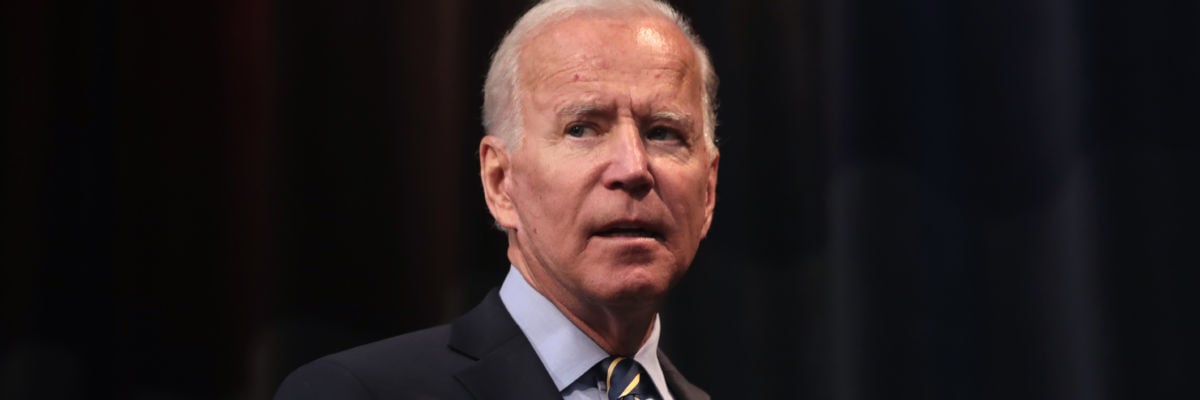
The 2022 midterms are today, and Democrats have tried (perhaps to their electoral detriment) to turn the elections into a referendum on abortion. This has meant lots of scary-sounding ads about how their opponents are pro-life across the board. It’s also meant that Catholic politicians have been trying to explain why they simultaneously consider themselves Catholic and pro-choice.
The latest to do so was President Joe Biden. In remarks last week, the president said, “Roe vs. Wade didn’t satisfy everyone. I’m a practicing Catholic. I’ve supported Roe vs. Wade.”
The truth is more complicated. Biden originally didn’t support Roe v. Wade. In a 1974 interview, he said, “My wife said I was the most socially conservative man she had ever known” and that “when it comes to issues like abortion, amnesty, and acid, I’m about as liberal as your grandmother. I don’t like the Supreme Court decision on abortion. I think it went too far. I don’t think that a woman has the sole right to say what should happen to her body.” In 1982, he voted for a constitutional amendment to overturn Roe v. Wade. It was only in 2019 that he stopped supporting the Hyde Amendment, the legislation prohibiting federal funding (in most cases) from being used to abort children.
So what happened? There are seemingly two possibilities: either Biden shamelessly sold out his principles for political support, knowingly sacrificing an untold number of lives of unborn children for his political ambitions; or else he discovered some pro-choice argument so persuasive that he could no longer hold to his former “socially conservative” convictions. So with that in mind, here’s how Biden explains his position:
And the reason I support Roe vs. Wade is the most rational basis upon which confessional faiths can agree: No one knows precisely when does human life begin. (Inaudible) broke into the three trimesters. It made sense. It made sense on who has what authority under what circumstances.
The president’s claim about how “confessional faiths” agree that “no one knows precisely when does human life begin” wasn’t just a bizarre misstatement. It’s a false talking point he repeatedly uses. His initial reaction to the Supreme Court overturning Dobbs was to say that “all basic mainstream religions have historically concluded that the right—that the existence of a human life and being is a question.”
But before we get there, let’s talk about the “trimester framework” invented by Roe v. Wade. That framework never “made sense.” For starters, it wasn’t rooted in any coherent moral, scientific, or legal principle. It was the creation of an “unknown Supreme Court clerk” and was utterly arbitrary. You don’t have to take my word for it. In his private memos, Justice Blackmun, the author of the Roe v. Wade decision, admitted as much, saying, “This is arbitrary. . . . But perhaps any other selected point, such as quickening or viability (of the fetus), is equally arbitrary.”
In addition to being arbitrary and unprincipled, the trimester framework was also a disaster in practice. A decade after Roe, in 1982, Justice Sandra Day O’Connor complained that “the trimester approach is a completely unworkable method of accommodating the conflicting personal rights and compelling state interests that are involved in the abortion context.” And in 1992, seven of the Court’s nine justices ruled against the trimester framework, with three pro-choice justices (O’Connor, Kennedy, and Souter) admitting that “a framework of this rigidity was unnecessary and in its later interpretation sometimes contradicted the State’s permissible exercise of its powers.” So the trimester framework the president defends wasn’t overturned in Dobbs—it was overturned thirty years ago in Casey, because both pro-life and pro-choice jurists realized that it was arbitrary, excessive, and “completely unworkable.”
What about the president’s other talking point, that all “confessional faiths can agree” that “no one knows precisely when does human life begin,” and that “all basic mainstream religions have historically concluded that the right—that the existence of a human life and being is a question”? That’s an obvious untruth. The president’s own “confessional faith” says that “human life must be respected and protected absolutely from the moment of conception. From the first moment of his existence, a human being must be recognized as having the rights of a person—among which is the inviolable right of every innocent being to life” (CCC 2270).
But imagine for a moment that President Biden is correct. Imagine a world in which no one knows whether or not life begins at conception. Legalized abortion either is (relatively) harmless, or else kills millions of people. What would be the appropriate legal response in such a case? Obviously, to outlaw it. Think about it this way: if you saw a demolition crew about to tear down a house, and you asked, “Wait, is someone living in there?”, you would hardly be comforted by them saying, “We don’t know.” In such a case, the only sane and ethical response would be to say, “Don’t proceed unless you can be confident that you’re not committing murder!”
That said, I don’t think Biden actually believes what he’s now saying (or at least, that the truth or falsity of what he’s saying doesn’t matter). These kinds of false claims are standard pro-choice bait. The argument tends to go something like this:
Pro-choicer: Abortion should be okay because the Bible (or the Church, or some saint, etc.) is totally fine with abortion.
Pro-lifer: No, actually the Bible (Church, saint, etc.) isn’t fine with abortion, as you can see from this evidence . . .
Pro-choicer: Aha! See? You just cited the Bible (Church, saint, etc.), therefore proving that you’re trying to impose your religion on us.
This is what I call the “abortion double-bind.” If you preach against abortion, you’re accused of being too political for church—the pro-abortion group Abortion Rights Mobilization sued to get the Catholic Church’s tax-exempt status revoked due to the Church’s pro-life beliefs. But if you vote against abortion, you’re accused of being too religious for politics, or even of trying to impose “theocracy” on America. Conveniently, there’s no room for people to speak out against the greatest evil of our day. On the other hand, it’s apparently perfectly fine for Protestant preachers to advocate for legalized abortion, or for the president to invoke St. Thomas Aquinas to justify supporting it.
Why do this? Why not just have an honest debate about the merits of abortion? Because pro-choicers realize that they can’t win the scientific argument. Biologically speaking, human life begins at conception. The Textbook of Clinical Embryology, for instance, defines ontogeny as “a branch of science which deals with the complete life cycle of an organism from conception to the birth, as per the blueprint hidden in its genome.” And of course, that’s what the word conception means: “beginning.” Asking whether life begins at conception is just asking whether it begins at its beginning. It’s an easy question.
This is nothing new. Two decades ago, Paul Bloom, a psychologist at Yale, argued that the scientific question of “when does life begin?” can’t solve the abortion debate because “the question is not really about life in any biological sense. It is instead asking about the magical moment at which a cluster of cells becomes more than a mere physical thing. It is a question about the soul.” In other words, don’t ask about the science! Think about the soul instead. As I said, that’s bait. Pro-lifers win if the conversation is rooted in secular arguments and science, and so pro-choicers will turn the conversation to religion or the metaphysics of the soul.
I can’t say what happened to President Biden, or how he went from “the most socially conservative man” on issues like abortion to making false (and even incoherent) claims about how religions don’t know when life begins. But I can say that it’s not because those pro-choice arguments are true, or particularly persuasive, if we take the time to examine them honestly.
Image credit: Gage Skidmore via Flickr, CC BY-SA 2.0.



